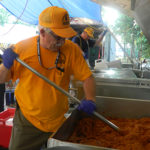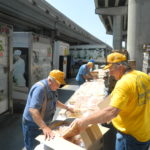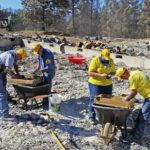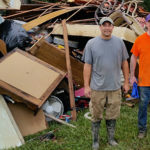CEDAR HILL—Cindy Wesch never intended to become involved with Texas Baptist Men Disaster Relief. She just wanted to help her family in Mississippi after Hurricane Katrina.

Cindy Wesch, a member of Hillcrest Baptist Church in Cedar Hill, served with the Texas Baptist Men chainsaw crew in Tuscaloosa, Ala., after a tornado hit earlier this year.
|
After the deadly hurricane hit in 2005, she and her husband loaded their car with fuel and food, planning to deliver them to relatives affected by the storm.
"All that we intended to do, we never did do. God had other plans," said Wesch, a member of Hillcrest Baptist Church in Cedar Hill. "We gave all the fuel to a local fire department."
After Wesch witnessed the work of Baptist disaster relief workers in the wake of Katrina, she returned home determined to find out how she could become involved.
She received basic disaster relief training from Texas Baptist Men and worked on the serving line of an emergency food-service unit following Hurricane Rita, just a few weeks after Katrina hit.

Mary Bess Jackson from First Baptist Church in Midlothian worked with a Texas Baptist Men Disaster Relief mud-out crew in Minot, N.D.
|

Kathy Patterson from Clearwater Baptist Church in Scroggins served in Minot, N.D., with a Texas Baptist Men Disaster Relief mud-out crew.
|
Subsequent disasters took her as far away as Massachusetts, Wisconsin and Alabama. And her involvement grew to include service with mud-out crews who cleaned buildings after floodwaters receded and chainsaw teams who cleared away downed trees after tornados and hurricanes.
Sign up for our weekly edition and get all our headlines in your inbox on Thursdays
Her personal story of growing engagement with disaster relief reflects the role of women in general with TBM Disaster Relief ministry, said Bob Dixon, who has served with the organization since 1968, including nearly three decades as executive director.
Woman's Missionary Union of Texas led in raising the money to build the nation's first Baptist disaster relief mobile feeding unit and the first childcare unit, he recalled.
In terms of frontline involvement in disaster relief, women first served with the childcare and food-service units as early as the 1979 Wichita Falls tornado, Dixon said.

Cindy Wesch, a member of Hillcrest Baptist Church in Cedar Hill, served with the Texas Baptist Men mud-out crew in Georgia after floods in 2009.
|
But in more recent years, women have become involved in every aspect of disaster relief, including laundry units, chainsaw crews and mud-out teams. Women constitute more than one-third of the trained TBM Disaster Relief volunteer workforce, and 15 percent of the on-site coordinators are female.
"The latest disaster relief unit to come on line had to have a woman's touch. It's called a box unit," Dixon added. The box unit delivers hard-sided boxes to disaster sites to help victims gather and safely store any treasured possessions they discover as they dig through the rubble of their destroyed homes or pack up keepsakes from a flooded home.
Wesch saw the need for the box unit firsthand in 2006 when she and other volunteers tried to help disaster victims collect and reclaim their possessions.
"All we had were trash bags," she recalled. "It broke my heart for people to find pieces of their china, only to have it break when they put in the bags."
Walking alongside disaster victims as they search for keepsakes and reminisce about the past provides openings for meaningful spiritual conversations, Wesch noted.
Wesch and other women also have been instrumental in gathering "messages of hope" for people who have experienced disasters and including them in boxes with their recovered belongings.
"We have children in Sunday school classes and at camps in the summer write notes to disaster victims," she said. "It's awe-inspiring to see the looks of the faces of people as they read the messages of hope from children."
When wildfires swept through vast stretches of Texas this summer, Wesch wanted to be a part of disaster relief in affected areas, but her asthma prohibited it.
However, since so many farmers and ranchers lost valuable grazing land, and since the price of a large round hay bale more than tripled, she started working with out-of-state sources to coordinate the delivery of donated hay.
"I'm gone from doing tea parties in nursing homes to delivering boxes in disasters, and now it looks like I'm in livestock," she noted.
"Some of my friends ask me how I manage, but it's really no problem. I don't have any trouble finding time for ministry. God makes the time for it."















We seek to connect God’s story and God’s people around the world. To learn more about God’s story, click here.
Send comments and feedback to Eric Black, our editor. For comments to be published, please specify “letter to the editor.” Maximum length for publication is 300 words.